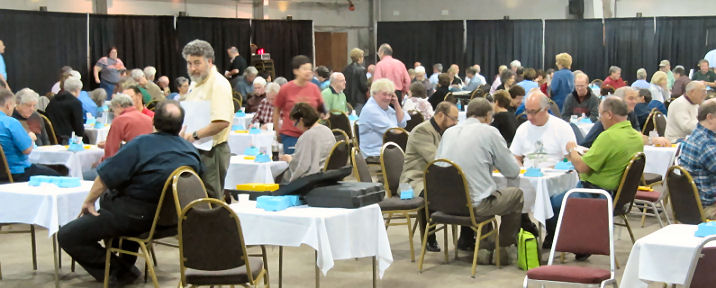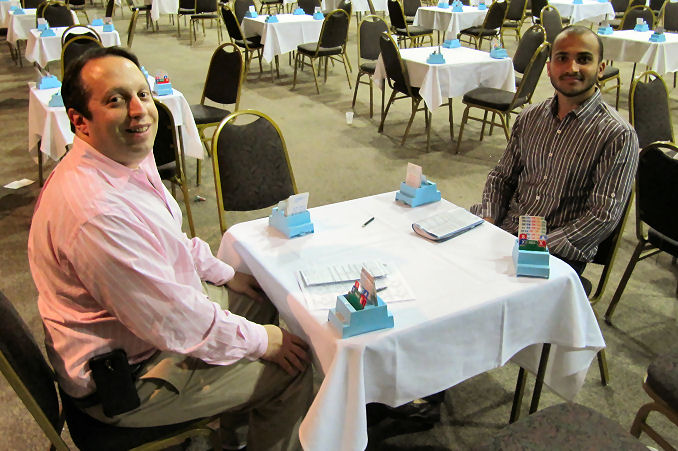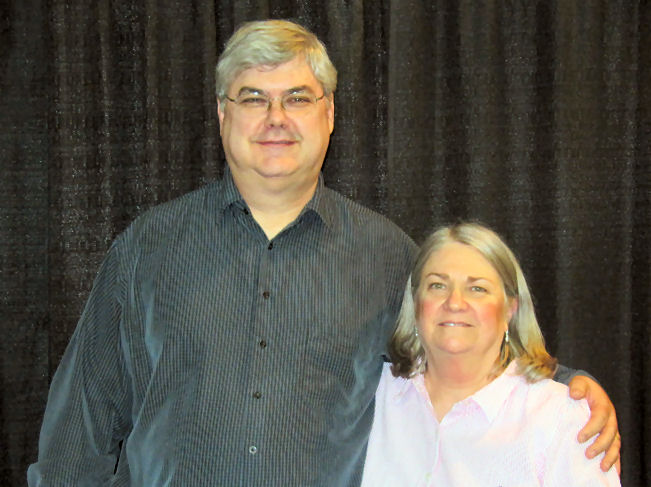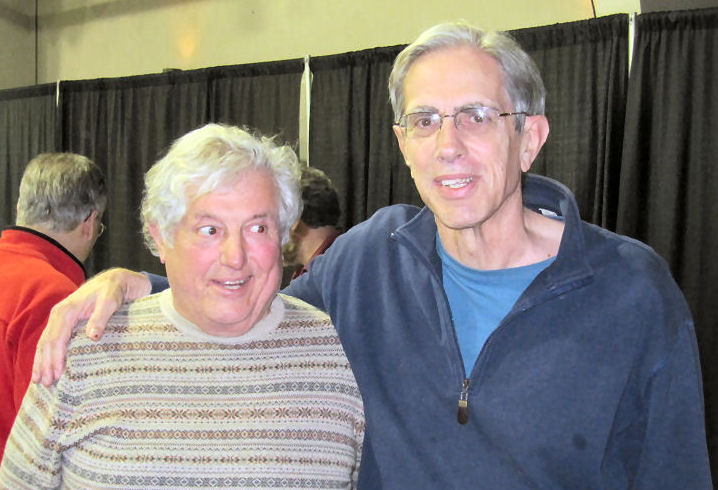

Sturbridge, MA, was the familiar site for the regional qualifier for the North American Pairs on the weekend of October 19-20. The format for the event is different from that of any other. There are three flights. Flight A is open to all ACBL members of District 25; Flight B players may have up to 2,000 masterpoints; only non-Life Masters with fewer than 500 masterpoints may play in Flight C. All players in all flights must first qualify in a local club game. The Flight C event involves two sessions on Saturday. Flights A and B have two sessions on both Saturday and Sunday.
Winning (or even placing in) this event is a very big deal. The district provides cash subsidies to help defray the expenses for the participants who have earned the right to represent New England in the NAP final in the Spring NABC in Dallas.
I had only played in the NAP once before. Steve Smith and I were lucky enough to place in Flight C four years ago. We attended the NABC event in Reno that year. Although we did not do very well in the NAP, we did win a compact knockout, and we had a blast. Incidentally, Steve is still a C player. Someone looking for a really good partner who still has all of his grey cells should try to persuade him to sit across from them in next year’s event.
The winners in Flight C this year were Neil Kreuzer and Akhil Ketkar (above). Their victory qualifies them to play in the national event in Dallas. The runners-up in Flight C were Richard Tracy and Nora Miller. Third place went to Timothy Pettus and Thomas Greehan III. All three pairs can play in Dallas.
Mike and Susan Smith posted two very strong results on Sunday to win Flight B. It is of interest to note that the couple made it to the second day of Flight A last year. The other two pairs that qualified for Dallas were Larry Hanerfield and Naresh Mehta (second place) and Alice Hummel and Joyce Calcagnini.
Another pair from the Nutmeg State, Rich DeMartino and Geof Brod, also caught on fire on Sunday. Their first-place finishes in both the morning and afternoon sessions of Flight A on Sunday made up for a slightly sluggish Saturday. Second place went to Alan Applebaum and Walter Lee, and the team of Mark Aquino-Norman Humer finished third. Since Rich’s duties as District Director will prevent him from participating in the event in Dallas, the fourth-place team of Doug Doub and Frank Merblum also qualified.
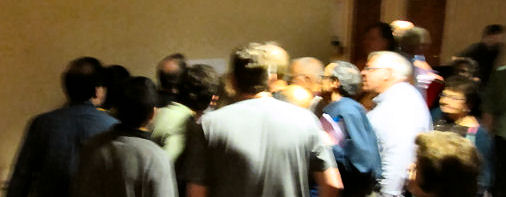
Everyone who takes bridge seriously should play in this event. It is intense. The air in the room at the end of Saturday’s evening round was positively electric with excitement. The Flight C players were anxious to find out if they would get to play in the Nationals, and the players in B and A were fretting about making the cut. I think that the most thrilling experience that I have ever had in bridge was to see that Q by our name in 2009. Determining that we would get to play on Sunday this year was not far behind.
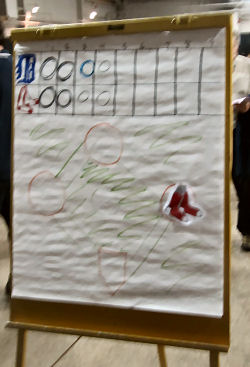
I cannot emphasize this enough. If you are the kind of person who enjoyed the pressure of taking SAT tests, you should make plans now to play in the NAP qualifier next year. If nothing else, it will give you a very good idea of where your bridge game stands vis-à-vis that of your peers.
One thing that I learned from the event this year was that I need to work on my conditioning. I did not sleep well on Saturday night. Both my partner and I were exhausted by the break between sessions on Sunday. By the end of the event we were both punch-drunk. I suspect that it is no coincidence that the winning teams in both A and B consistently play in the full knockouts and achieved their best scores in the very last session.
One more thing. As much as I enjoyed driving through downtown Stafford Springs four times in two days, I think that in future years I will get a room at the hotel.
Two hands stood out for me this year. The first one, which made its appearance in the Saturday evening round, must have been designed by some demon-spawn to punish the players that sat East-West. The vulnerability was unfavorable when as dealer I picked up a really nice-looking hand:
♠ A K J 7 5 3 2 ♥ 3 ♦ A K ♣ Q 7 5
With only four losers and four quick tricks I felt pretty confident opening two clubs. I certainly did not want to hear three passes after a 1♠ bid. [Yes, you did!] My left-hand opponent made a preemptive bid of 3♦, which was passed around to me. I naturally bid my spade suit. My partner took about an hour and a half to produce a pass card, at which point the right-hand opponent doubled. I could hardly believe it. They weren't going to let me play a doubled contract at the three level when I held a seven-card suit with only four losers, were they? I passed quickly, and so did the opponent who had preempted.
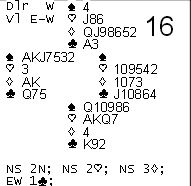 At this point beads of perspiration began to form on my partner’s brow. He reached for his bidding box and then thought better of it several times. Finally, he exhumed the blue card with two X’s and gingerly set it on top of the green one.
At this point beads of perspiration began to form on my partner’s brow. He reached for his bidding box and then thought better of it several times. Finally, he exhumed the blue card with two X’s and gingerly set it on top of the green one.
I felt like passing, but then I remembered the penalties for redoubled vulnerable contracts: 400, 1,000, 1,600, and so on. Gulp. My three-card club suit was not very appetizing, and I knew that seven diamonds were lurking at my left elbow. Besides, the last thing that I wanted to do at this point was to commit to taking ten tricks.
I ventured 3NT, which was, of course, doubled. I went down three, which saved me the ignominy of a four-digit score in the wrong column, but only because Shirley Derrah, the LHO, had pity on me and led a spade at one point.
What would you have done? Despite my powerhouse, the only contract that East-West can make is one lousy club! Can you imagine getting this hand and then writing down the number 70 as your score?
One of the few bright spots of our game on Sunday came on the most unusual hand of the tournament. This time neither side was vulnerable, and the deal was on my left as I admired the collection that was artfully fanned in my left hand:
♠ A 8 ♥ A J 9 6 4 3 ♦ A 5 2 ♣ A 7
I was not too surprised that the dealer had bid, but the appearance of the 1♥ card on the table before him was rather startling. My partner doubled. If the other opponent had bid, I certainly would have checked the backs of my cards, but she passed. After trying to think of a stronger bid, I settled on 2♥, which was doubled by LHO. My partner bid 3♠. That’s right: 3♠, not 2♠.
Well, well, well. I wondered what he might be holding. How could I possibly find out? I could not think of anything clever, so I decided to try RKCB. As expected, he bid 5♦ to show the ♠K. I asked about the queen by removing the 5♥ card from my bidding box.
Another long delay elapsed before his 5♠ bid appeared on the table. The obvious break in rhythm visibly upset the dealer. He asked me if I acknowledged the slowness of the bid, and I did. I was hoping that my partner had the ♠Q just so that he could tell me whether he had a side king. Oh, well. I thought of the Sounds Orchestral and cast my fate to the wind, and, because it was match points, I bid 6NT.
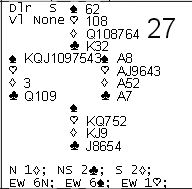 Because we were the last foursome still playing, and the round had been called, David Metcalf, the director, was already hovering around our table. LHO put a club on the table. I played the nine from dummy, which was followed by the king and my ace. I then claimed the rest.
Because we were the last foursome still playing, and the round had been called, David Metcalf, the director, was already hovering around our table. LHO put a club on the table. I played the nine from dummy, which was followed by the king and my ace. I then claimed the rest.
The dealer thought that I had gleaned something from my partner’s delayed bid. I explained that I had already decided to go to six and was looking for a grand slam. When David saw that I had all of the controls, he accepted my bid.
So, why, you may ask, did my partner take so long and then lie about the ♠Q? He later confided that he had forgotten about the queen-ask. He thought that I was showing a heart control.
Incidentally, our score was not a top. One pair bid and made the grand slam. Whoever did it must have also benefited from a club lead. [Actually, two pairs bid the Granny, one in spades and one in no-trump. Both made it. I heard from Tom Proulx, who bid the spade slam. He explained that South discarded a heart on a trump lead, and he was able to establish a long heart for the thirteenth trick.]

